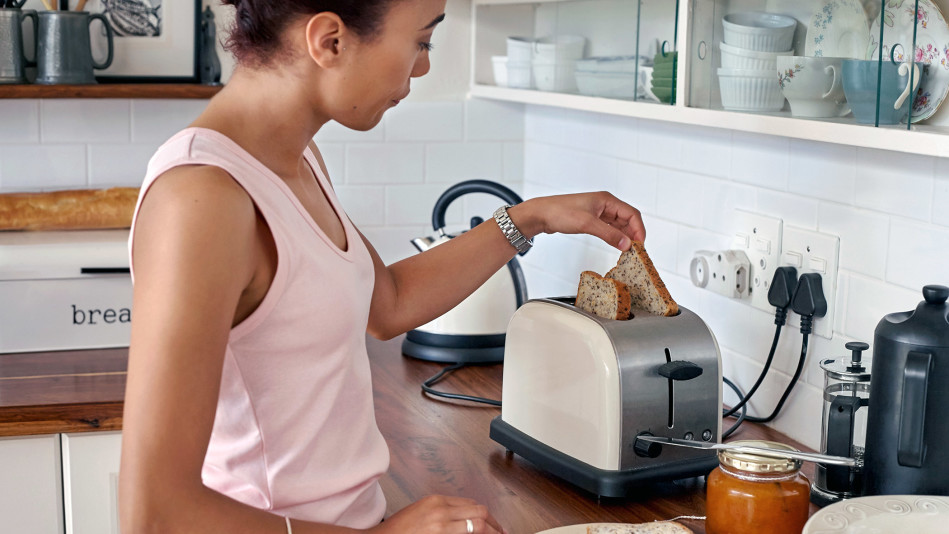Flip the Script on Your Reaction to Stress
The old routine: When the physical signs of stress kick in (pounding heart, shaky hands, queasy feeling in your gut), you start to believe that you’re headed for certain disaster.
The new habit: Tell yourself that those reactions are just your body gearing up for an off-the-charts job with whatever’s on your plate.
Why you’ll be happier: When volunteers who were about to deliver a speech were told that their stress was really just a sign that oxygen was pumping to their brain to help them thrive under pressure, they reported feeling better and performed better than volunteers who tried to ignore or minimize their stress, found a study from the University of Rochester. Work done by happiness researcher and author Shawn Achor also found that people trained to think of their stress response as a good thing reported fewer psychological issues.
The new habit: Tell yourself that those reactions are just your body gearing up for an off-the-charts job with whatever’s on your plate.
Why you’ll be happier: When volunteers who were about to deliver a speech were told that their stress was really just a sign that oxygen was pumping to their brain to help them thrive under pressure, they reported feeling better and performed better than volunteers who tried to ignore or minimize their stress, found a study from the University of Rochester. Work done by happiness researcher and author Shawn Achor also found that people trained to think of their stress response as a good thing reported fewer psychological issues.
Have This Kind of Date with Your Partner
The old routine: You two talk all the time—about work stress, money stress, what’s for dinner that week (and who’s making it), whose turn it is to fold the laundry…
The new habit: Set aside 10 minutes every day for a conversation that doesn’t revolve around to-dos or daily minutia
Why you’ll be happier: Having open-ended conversations is critical to maintaining a happy union, says Terri Orbuch, a psychologist and the author of 5 Simple Steps to Take You Marriage From Good to Great. Her suggestions for topics: “If you won the lottery, where would you go and why?” “Which parent were you closer to growing up?” or “If you could start over with any career, what would it be?” “Our partners change over time, and there are new things going on with them,” Orbuch says. “That third date was novel and interesting and surprising, and it was wonderful. Have that third date again.”
The new habit: Set aside 10 minutes every day for a conversation that doesn’t revolve around to-dos or daily minutia
Why you’ll be happier: Having open-ended conversations is critical to maintaining a happy union, says Terri Orbuch, a psychologist and the author of 5 Simple Steps to Take You Marriage From Good to Great. Her suggestions for topics: “If you won the lottery, where would you go and why?” “Which parent were you closer to growing up?” or “If you could start over with any career, what would it be?” “Our partners change over time, and there are new things going on with them,” Orbuch says. “That third date was novel and interesting and surprising, and it was wonderful. Have that third date again.”
Do This Before You Walk Out the Front Door in the Morning
The old routine: Run through the phone-keys-wallet mental checklist.
The new habit: Add sunglasses to the list.
Why you’ll be happier: Your mood and your facial muscles are linked—you’ve no doubt heard about the research showing that just forcing a smile improves your mood. Following that logic, squinting (which mimics the look you take on when you’re mad as heck) can make you feel angry, says Daniele Marzoli, PhD, a psychologist at Italy’s University of Chieti-Pescara, who adds that the effect is pretty much instantaneous. A pair of stylish sunglasses will solve the problem.
The new habit: Add sunglasses to the list.
Why you’ll be happier: Your mood and your facial muscles are linked—you’ve no doubt heard about the research showing that just forcing a smile improves your mood. Following that logic, squinting (which mimics the look you take on when you’re mad as heck) can make you feel angry, says Daniele Marzoli, PhD, a psychologist at Italy’s University of Chieti-Pescara, who adds that the effect is pretty much instantaneous. A pair of stylish sunglasses will solve the problem.
Take a Quick Break from Being the Office Hermit
The old routine: A demanding job means you’re laser-focused at work with not a social minute to spare.
The new habit: Check in daily with your work wife, even if it’s just a fly-by at her desk.
Why you’ll be happier: First, the extrinsic motivator: People with a best friend at work are 47 percent more likely to have received praise or recognition in the past week, possibly because having a buddy at the office increases your motivation and productivity. But there’s a deeper reason too: Social time with your colleagues is the only thing proven to even come close to making us as happy as we are outside the office, reports a study from the London School of Economics.
The new habit: Check in daily with your work wife, even if it’s just a fly-by at her desk.
Why you’ll be happier: First, the extrinsic motivator: People with a best friend at work are 47 percent more likely to have received praise or recognition in the past week, possibly because having a buddy at the office increases your motivation and productivity. But there’s a deeper reason too: Social time with your colleagues is the only thing proven to even come close to making us as happy as we are outside the office, reports a study from the London School of Economics.
Make More like a Florist
The old routine: You don’t notice your coffee table bouquet is dead until the petals are everywhere.
The new habit: Buy new flowers before the old ones are total goners.
Why you’ll be happier: One way to see the world through more rose-colored glasses is to actually see some roses (or any other plant or flower). Women who saw flowers when they woke up said they felt happier and less anxious at home and more energetic at work, found a study led by Harvard Medical School psychologist Nancy Etcoff, PhD. Plants and flowers might serve as a subconscious cue that our environment is safe and prosperous, giving you a more positive outlook for the day as soon as you see them, according to evolutionary psychologists.
The new habit: Buy new flowers before the old ones are total goners.
Why you’ll be happier: One way to see the world through more rose-colored glasses is to actually see some roses (or any other plant or flower). Women who saw flowers when they woke up said they felt happier and less anxious at home and more energetic at work, found a study led by Harvard Medical School psychologist Nancy Etcoff, PhD. Plants and flowers might serve as a subconscious cue that our environment is safe and prosperous, giving you a more positive outlook for the day as soon as you see them, according to evolutionary psychologists.
Give Back at Work, but Be Choosy About It
The old routine: When coworkers ask for help, the answer is almost always “I wish I could—too busy.”
The new habit: Quiet the voice insisting you say no, and if the request is relatively small, say yes.
Why you’ll be happier: As long as you’re not so charitable with your time that you’re left with none in which to do your own tasks, lending a helping hand at work increases your happiness, found a study at the University of Wisconsin-Madison. In another experiment, when people helped others for just a little bit of time each day, they actually felt like they were less time-constrained, possibly because their altruistic action made them feel more confident, useful and capable.
The new habit: Quiet the voice insisting you say no, and if the request is relatively small, say yes.
Why you’ll be happier: As long as you’re not so charitable with your time that you’re left with none in which to do your own tasks, lending a helping hand at work increases your happiness, found a study at the University of Wisconsin-Madison. In another experiment, when people helped others for just a little bit of time each day, they actually felt like they were less time-constrained, possibly because their altruistic action made them feel more confident, useful and capable.
Check Yourself (Posture-Wise, That Is)
The old routine: You only break from slouching when you notice that dull ache in your back. Even then, the breaks are short.
The new habit: Set an hourly (or even half-hourly) reminder to assume the proper position.
Why you’ll be happier: Good posture can make you feel happier, more enthusiastic, more excited and even stronger. It can also make you more likely to remember the positive things you’ve got going in your life, according to a small study in the Journal of Behavior Therapy and Experimental Psychiatry. Plus, you’ll stop hearing your mom’s voice in your head telling you to stop slouching.
The new habit: Set an hourly (or even half-hourly) reminder to assume the proper position.
Why you’ll be happier: Good posture can make you feel happier, more enthusiastic, more excited and even stronger. It can also make you more likely to remember the positive things you’ve got going in your life, according to a small study in the Journal of Behavior Therapy and Experimental Psychiatry. Plus, you’ll stop hearing your mom’s voice in your head telling you to stop slouching.
Rethink Your “Variety Is the Spice of Life” Approach
The old routine: You try to keep your days unique from one to the next.
The new habit: Automate at least one daily decision (breakfast is a great place to start)
Why you’ll be happier: The more choices you have to make in a day, the more your stamina, judgment, emotional self-control—and your happiness, by extension—get sapped. As psychologist Roy Baumeister explained, the willpower you use in decision-making is like a muscle that gets fatigued. One less choice to make means a little more juice in the tank.
The new habit: Automate at least one daily decision (breakfast is a great place to start)
Why you’ll be happier: The more choices you have to make in a day, the more your stamina, judgment, emotional self-control—and your happiness, by extension—get sapped. As psychologist Roy Baumeister explained, the willpower you use in decision-making is like a muscle that gets fatigued. One less choice to make means a little more juice in the tank.








